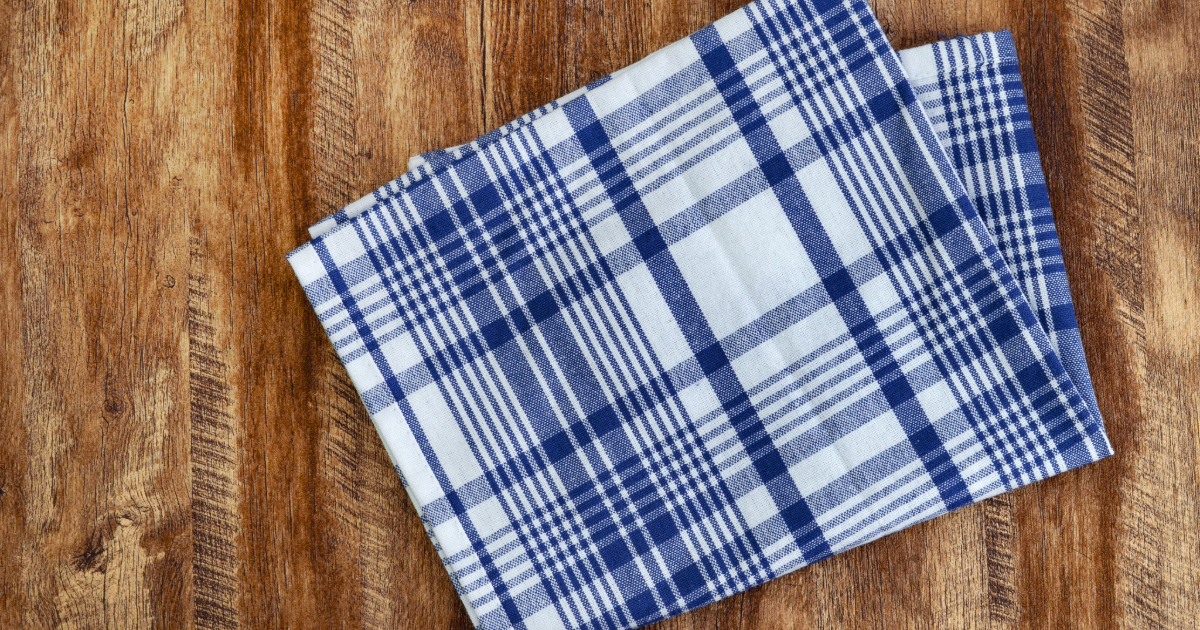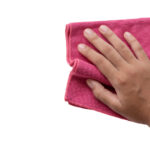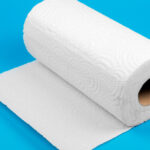Have you ever pulled a dish towel out of the drawer or off the hook, only to be hit with an unpleasant musty odor? You probably wondered, why do my dish towels smell bad?

This sour smell coming from your kitchen linens is more than just unpleasant – it can indicate bacterial growth that could spread onto your dishes, countertops, and hands.
The good news is that with some simple adjustments to how you care for, handle, and store your dish towels, you can stop them from smelling and create a fresher, cleaner kitchen environment.
What Causes Dish Towels to Smell?
There are a few key culprits behind that funky odor emanating from your dish towels:
Once your towels start to sour, they become more than just a smell nuisance. They can also spread illness-causing germs around your kitchen via cross-contamination.
Key Takeaway: Bacteria, moisture, heat, and fabric softeners are main causes of smelly dish towels. Sour odors indicate bacterial growth that can transfer to hands, dishes, and counters.
How to Keep Dish Towels Smelling Fresh
Luckily, with some easy preventative measures, you can stop your dish towels from smelling bad in the first place. Follow these tips:
Choose the Right Fabrics
Looped terry cloth or textured huck towels absorb better and dry faster than plush, smooth fabrics. Stick to thin, lightweight towels whenever possible.
Rinse After Each Use
Rinse towels thoroughly under hot, soapy water after every use. This flushes away food particles and grease that bacteria feed on. Wring out all excess moisture so they dry fast.
Allow Proper Air Circulation
After rinsing, drape towels over cabinet handles/faucets or hang on racks. Don’t leave in sink or bunched up. Exposure to air inhibits bacterial growth and odors.
Avoid Using Fabric Softeners
Skip the fabric softener, as residues trap moisture and smells over time. For softness, add 1/4 cup baking soda or white vinegar to rinse cycle.
Wash Regularly in Hot Water
Launder kitchen towels every 2-3 days on hot “sanitize” cycle. Wash with detergent and oxygen bleach. Avoid leaving wet towels in machines.
Dry Thoroughly
Tumble dry dish towels on high heat or hang in direct sunlight. The UV light and heat further sanitize them.
Replace Old Towels
Retire overly frayed, worn out towels. Their deeper crevices cling to more bacteria-feeding particles. Swap kitchen towels out seasonally.
By following those best practices, you’ll curtail bacterial growth substantially. But what if your towels already have that dreaded stench?
Key Takeaway: Rinsing, air drying, skipping fabric softener, hot washing, UV light drying, and rotating towels help prevent musty smells.
How to Remove Smells from Dish Towels
If your dish towels already smell unpleasant, don’t worry. You can rehabilitate them and eliminate sour odors with some simple cleaning methods.
Boiling
Boil funky smelling towels for 10-15 minutes in water mixed with either:
After boiling, dry towels in sunlight. The heat kills bacteria and vinegar/baking soda deodorizes.
Soaking
Prior to washing, soak stinky towels for 30 minutes in:
Then launder as usual with detergent in hot water and dry.
Washing
To sanitize laundry loads containing sour towels, wash on hot setting with:
As a last resort for eliminating stubborn lingering odors, wash towels in chlorine bleach.
Being diligent about these towel cleaning methods, along with the preventative steps outlined earlier, means you’ll have fresh-smelling linens every time.
Key Takeaway: Boiling, soaking, and washing with deodorizing agents all help strip away dish towel smells before they take over your kitchen.
FAQs
Why do my new dish towels smell bad quickly?
Even brand new towels that smell unpleasant fast likely have lingering odors from dyeing or improper drying at factories. Give them an initial deep clean via boiling, hydrogen peroxide soak, or hot machine wash before first use.
How often should you replace dish towels?
Plan to swap out all regularly used kitchen linens every 3-6 months. Worn, frayed towels with deeper crevices cling to more residue and smell faster despite cleaning attempts.
Can you put smelly dish towels in the dishwasher?
Yes! Run them through empty dishwasher cycles on the hottest setting. The intense heat, harsh detergents, and forceful spray help eliminate odors and bacteria. (Wash anything else needing disinfection this way too!)
Why do my towels get a mildew smell in the laundry?
Leaving laundered towels sitting wet in machines breeds mildew, which produces a musty, unpleasant smell. Always promptly remove clean towels from washers and dryers to prevent this.
What’s the best way to dry dish towels?
The combination of sunshine’s UV rays and heat from tumble drying seems most effective at killing lingering bacteria that cause smells. Hang dried towels in sunlight first if possible, then give them a short machine dry.
Conclusion
Following the cleaning and handling best practices outlined above will help prevent unpleasant odors from taking over your kitchen.
With some diligent towel maintenance habits, you can say goodbye to worrying about what that sour smell clinging to the towels is!








